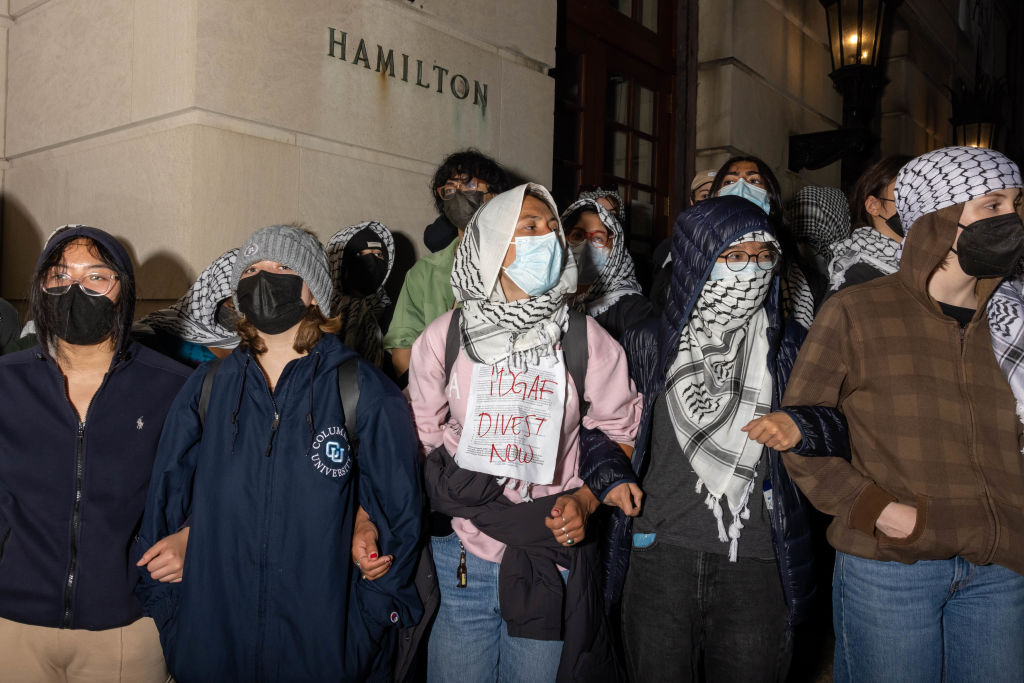One of the key critiques of DEI — the identity-based preference system better known as Diversity, Equity and Inclusion — is that it places workers in professional positions they’re clearly unqualified for. Often with devastating outcomes.
Boeing, for instance, has been accused of favoring race and gender when hiring for its factory floor — factories that have turned out airplanes that have literally fallen from the skies. Disney, too, has seen its quest for race- and gender- and sexuality-based inclusiveness come at a cost — a steep slide in its stock price.
But no area of public life has been more fully infiltrated by DEI than the academy — and the results have been disastrously on display since the Hamas attack against Israel nearly seven months ago. That was when presidents at prestige universities such as Harvard, MIT, Columbia and Penn allowed their schools to be overrun by the pro-Palestinian mayhem that led to last week’s encampment chaos at academic institutions nationwide.
But while these presidents may share the stain of their inaction, they also share another common, and curious, denominator: all are incredibly new to their jobs. Take Nemak Shafik, president of Columbia University who testified before Congress last week about her plans to (finally) reduce Jew-hatred on her Upper Manhattan campus. An economist by training, the Egyptian-born scholar has only led Columbia since July of last year. Same thing with Claudine Gay, the former president of Harvard; like with Shafik, Gay also assumed the presidency this past July 1.
Liz Magill, the former president of the University of Pennsylvania — she was also a new appointee, entering office in July 2022 — before being sent packing, much like Gay, barely eighteen months later. And then there’s Sally Kornbluth, president of MIT, who’s only held her position since January 2023. Four university leaders – all women, all brand new to their jobs, just as American campuses are hit by the most widespread student unrest since the Vietnam War.
Magill and Gay, of course, are no longer in office, but for the most outspoken critics of DEI — naysayers such as billionaire Bill Ackman or Bari Weiss — these women should never have been hired at all. Depending on your politics, their presence atop America’s education establishment is either a DEI triumph — or tragedy.
Either way, October 7 was the first wide-scale stress test of DEI’s integrity — and the system failed spectacularly. Much of that failure rests in the hands of leaders such as Gay, Kornbluth, Magill and Shafik, whose inability to articulate an effective anti-hate strategy suggested Ackman and Weiss might actually be onto something.
Of course, no one can know if a man would have handled these crises differently – though Princeton University immediately arrested protesters who tried to set up an encampment Thursday morning. Its president — a man named Christopher Ludwig Eisgruber — has also been in post since 2013.
Still, rooting this rot in gender — or ethnicity in the case of Gay, who’s black or Shafik, who’s Arab — is almost too easy. Women have long led both entire nations and Fortune 500 companies with ample success and achievement.
The real question lies in these women’s accomplishments before they were hired — and how they performed amid crises so soon after taking office. Gay, for instance, was ultimately ousted as much for alleged plagiarism as for her campus impotence — both, understandably, leave critics questioning her credentials.
Nasty stuff, for sure. But what’s most telling about these women is that all — except for Shafik, a World Bank and Bank of England-vet — are essentially career academics. There’s virtually no private sector or government experience between Gay, Magill or Kornbluth. Same story with New York University president Linda G. Mills – who, guess what — has held her position for less than a year and has also seen her campus inflamed by antisemitic protests, including a pro-Gaza tent encampment this past week.
Most crucially, these women have spent almost their entire careers at the universities they lead (or led), further contributing to their executive myopia and insularity.
This is not entirely unusual: Eisgruber is also a career academic. But many of the most celebrated recent university presidents such as Harvard’s Larry Summers — who was President Clinton’s Treasury secretary — and former University of California president (and one-time Arizona governor and Department of Homeland Security chief) Janet Napolitano succeeded precisely because of their non-academic acumen.
In other words, it’s not that women like Gay or Magill failed to keep their universities safe because they’re women. Rather, being women helped them rise amid an academy so rife with unchallenged DEI indoctrination that they were never expected to encounter such crises in the first place. This is the real problem with DEI — its embrace of diminished expectations and its faith in leaders who embody them.
More than a week into Columbia’s Gaza extremism, calls are mounting for President Shafik to resign — and with good reason. Despite pledging before Congress to secure her campus, Shafik’s actually shutting it down: amid increasingly violent protests, Columbia announced that students may now opt to complete their semesters remotely. Unsurprisingly, campus Rabbi Elie Buechler has advised Jewish students to go online and go home.
Now compare Columbia to the University of Southern California in Los Angeles, which was rocked by its own Gaza-related madness earlier this month. Here, the beef centered around USC’s proposed commencement speaker, Asna Tabassum, a first-generation Asian-American Muslim with a paper-trail of hate-filled anti-Jewish Instagram posts.
Unlike Columbia or NYU, who have tried to placate their protesters, USC president Carol L. Folt opted to cancel commencement and be done with the drama entirely. Tough call, but tougher situation. Most crucially — tough leader making tough choices. President Folt, like her embattled East Coast contemporaries, is also a woman. But guess what — she’s been on the job for five long years.


























Leave a Reply